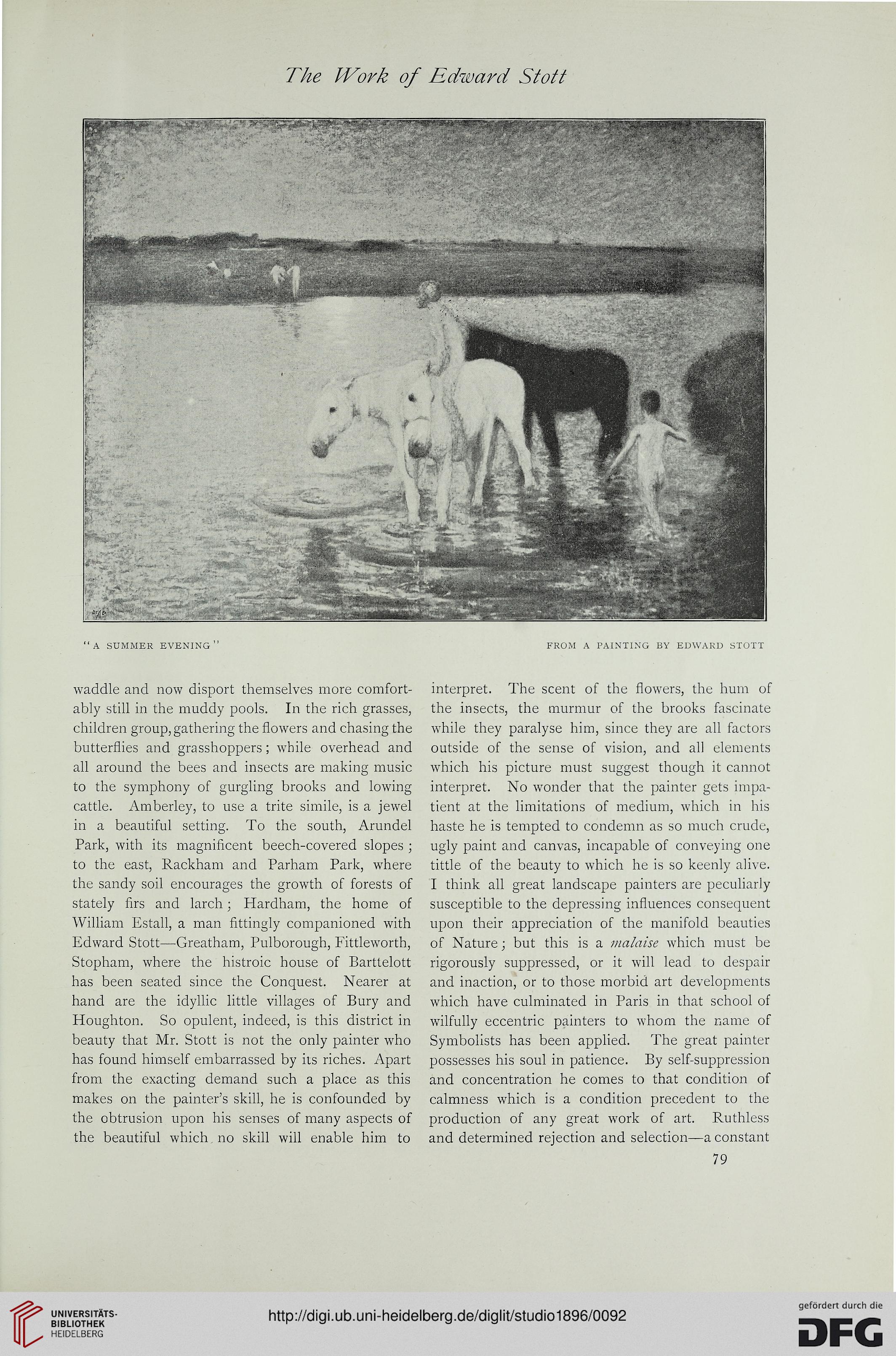The Work of Edward Stott
waddle and now disport themselves more comfort-
ably still in the muddy pools. In the rich grasses,
children group, gathering the flowers and chasing the
butterflies and grasshoppers; while overhead and
all around the bees and insects are making music
to the symphony of gurgling brooks and lowing
cattle. Amberley, to use a trite simile, is a jewel
in a beautiful setting. To the south, Arundel
Park, with its magnificent beech-covered slopes ;
to the east, Rackham and Parham Park, where
the sandy soil encourages the growth of forests of
stately firs and larch; Hardham, the home of
William Estall, a man fittingly companioned with
Edward Stott—Greatham, Pulborough, Fittleworth,
Stopham, where the histroic bouse of Barttelott
has been seated since the Conquest. Nearer at
hand are the idyllic little villages of Bury and
Houghton. So opulent, indeed, is this district in
beauty that Mr. Stott is not the only painter who
has found himself embarrassed by its riches. Apart
from the exacting demand such a place as this
makes on the painter's skill, he is confounded by
the obtrusion upon his senses of many aspects of
the beautiful which no skill will enable him to
interpret. The scent of the flowers, the hum of
the insects, the murmur of the brooks fascinate
while they paralyse him, since they are all factors
outside of the sense of vision, and all elements
which his picture must suggest though it cannot
interpret. No wonder that the painter gets impa-
tient at the limitations of medium, which in his
haste he is tempted to condemn as so much crude,
ugly paint and canvas, incapable of conveying one
tittle of the beauty to which he is so keenly alive.
I think all great landscape painters are peculiarly
susceptible to the depressing influences consequent
upon their appreciation of the manifold beauties
of Nature; but this is a malaise which must be
rigorously suppressed, or it will lead to despair
and inaction, or to those morbid art developments
which have culminated in Paris in that school of
wilfully eccentric painters to whom the name of
Symbolists has been applied. The great painter
possesses his soul in patience. By self-suppression
and concentration he comes to that condition of
calmness which is a condition precedent to the
production of any great work of art. Ruthless
and determined rejection and selection—a constant
79
waddle and now disport themselves more comfort-
ably still in the muddy pools. In the rich grasses,
children group, gathering the flowers and chasing the
butterflies and grasshoppers; while overhead and
all around the bees and insects are making music
to the symphony of gurgling brooks and lowing
cattle. Amberley, to use a trite simile, is a jewel
in a beautiful setting. To the south, Arundel
Park, with its magnificent beech-covered slopes ;
to the east, Rackham and Parham Park, where
the sandy soil encourages the growth of forests of
stately firs and larch; Hardham, the home of
William Estall, a man fittingly companioned with
Edward Stott—Greatham, Pulborough, Fittleworth,
Stopham, where the histroic bouse of Barttelott
has been seated since the Conquest. Nearer at
hand are the idyllic little villages of Bury and
Houghton. So opulent, indeed, is this district in
beauty that Mr. Stott is not the only painter who
has found himself embarrassed by its riches. Apart
from the exacting demand such a place as this
makes on the painter's skill, he is confounded by
the obtrusion upon his senses of many aspects of
the beautiful which no skill will enable him to
interpret. The scent of the flowers, the hum of
the insects, the murmur of the brooks fascinate
while they paralyse him, since they are all factors
outside of the sense of vision, and all elements
which his picture must suggest though it cannot
interpret. No wonder that the painter gets impa-
tient at the limitations of medium, which in his
haste he is tempted to condemn as so much crude,
ugly paint and canvas, incapable of conveying one
tittle of the beauty to which he is so keenly alive.
I think all great landscape painters are peculiarly
susceptible to the depressing influences consequent
upon their appreciation of the manifold beauties
of Nature; but this is a malaise which must be
rigorously suppressed, or it will lead to despair
and inaction, or to those morbid art developments
which have culminated in Paris in that school of
wilfully eccentric painters to whom the name of
Symbolists has been applied. The great painter
possesses his soul in patience. By self-suppression
and concentration he comes to that condition of
calmness which is a condition precedent to the
production of any great work of art. Ruthless
and determined rejection and selection—a constant
79




